Related Research Articles
Kapellmeister is a German word designating a person in charge of music-making. The word is a compound, consisting of the roots Kapelle and Meister ("master"). The word was originally used to refer to somebody in charge of music in a chapel. However, the term has evolved considerably in its meaning in response to changes in the musical profession.

Wittenberg, officially Lutherstadt Wittenberg, is a town in Saxony-Anhalt, Germany. Wittenberg is situated on the River Elbe, 60 kilometers (37 mi) north of Leipzig and 90 kilometers (56 mi) south-west of Berlin, and has a population of 48,501 (2008).
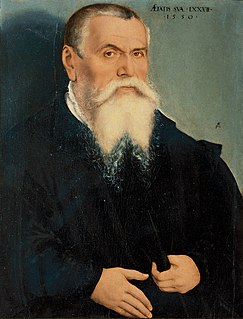
Lucas Cranach the Elder was a German Renaissance painter and printmaker in woodcut and engraving. He was court painter to the Electors of Saxony for most of his career, and is known for his portraits, both of German princes and those of the leaders of the Protestant Reformation, whose cause he embraced with enthusiasm. He was a close friend of Martin Luther. Cranach also painted religious subjects, first in the Catholic tradition, and later trying to find new ways of conveying Lutheran religious concerns in art. He continued throughout his career to paint nude subjects drawn from mythology and religion.

Frederick III, also known as Frederick the Wise, was Elector of Saxony from 1486 to 1525, who is mostly remembered for the worldly protection of his subject Martin Luther.

Georg(e) Spalatin was the pseudonym taken by Georg Burkhardt, was a German humanist, theologian, reformer, secretary of the Saxon Elector Frederick the Wise, as well as an important figure in the history of the Reformation.
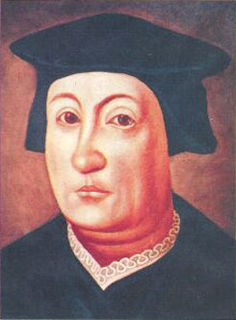
Justus Menius was a German Lutheran pastor and Protestant reformer whose name is Latinized from Jost or JustMenig.
Karl von Miltitz was a papal nuncio and a Mainz Cathedral canon.
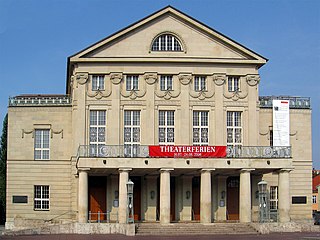
The Deutsche Nationaltheater and Staatskapelle Weimar (DNT) is a German theatre and musical organisation based in Weimar. It is a twin institution, consisting of the theatrical Deutsches Nationaltheater and the symphony orchestra known as the Staatskapelle Weimar. It has a total of six stages across the city and also hosts touring orchestras and theatre companies, as well as making appearances in electronic media.

Lutheran Service Book (LSB) is the newest official hymnal of the Lutheran Church–Missouri Synod (LCMS) and the Lutheran Church–Canada (LCC). It was prepared by the LCMS Commission on Worship and published by Concordia Publishing House, the official publisher of the LCMS. It is the fourth official English-language hymnal of the LCMS published since the synod began transitioning from German to English in the early 1900s. LSB is intended to succeed both The Lutheran Hymnal (TLH) and Lutheran Worship (LW) as the common hymnal of the LCMS. Supplemental and companion editions to the hymnal were released throughout the end of 2006 and into 2007. The hymnal was officially approved by the LCMS at the 2004 LCMS National Convention in St. Louis. It was officially released on September 1, 2006, but many customers who pre-ordered the hymnal received their copies several weeks earlier.
Johann Walter, also known as Johann Walther or Johannes Walter was a Lutheran composer and poet during the Reformation period.
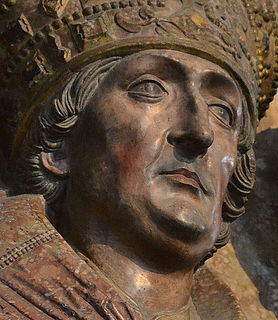
Lorenz von Bibra, Duke in Franconia was Prince-Bishop of the Bishopric of Würzburg from 1495 to 1519. His life paralleled that of Maximilian I (1459–1519), who served as Holy Roman Emperor from 1493 to 1519, whom Lorenz served as an advisor.
Deutsche Messe was published by Martin Luther in 1526. It followed his work Formula missae from the year 1523, pertaining to the celebration of a Latin mass. Both of these masses were meant only as suggestions made on request and were not expected to be used exactly as they were, but could be altered. The function of the mass, according to Luther, is to make people hear the word.
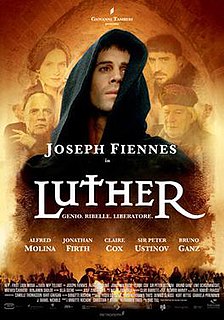
Luther is a 2003 American-German epic historical drama film loosely based on the life of Martin Luther starring Joseph Fiennes. It was an independent film partially funded by Thrivent Financial for Lutherans. The film covers Luther's life from his becoming a monk in 1505 to the Diet of Augsburg in 1530.
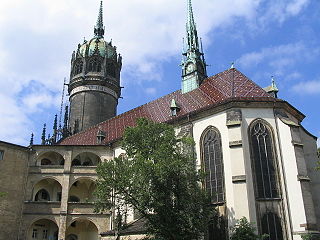
All Saints' Church, commonly referred to as Schlosskirche to distinguish it from the Stadtkirche of St. Mary's – and sometimes known as the Reformation Memorial Church – is a Lutheran church in Wittenberg, Saxony-Anhalt, Germany. It is the site where, according to Philip Melanchthon, the Ninety-five Theses were posted by Martin Luther in 1517, the act that has been called the start of the Protestant Reformation. From 1883 onwards, the church was restored as a memorial site and re-inaugurated on 31 October 1892, 375 years after Luther's posting.
Formula missae et communionis pro ecclesia Vuittembergensi (1523) was a 16th-century Latin liturgy composed by Martin Luther for Lutheran churches in Wittenberg.
A Mass of Life is a cantata by English composer Frederick Delius, based on the German text of Friedrich Nietzsche's philosophical novel Thus Spoke Zarathustra. In 1898, Delius had written a male choir and orchestral setting of "Midnight Song" from the same work, and this was revised to form part of the Mass.
Johann Hugo von Wilderer was a German Baroque composer. He was born in Bavaria and died in Mannheim, where in his later years he served as the Kapellmeister of the court orchestra. His compositions include eleven operas, two oratorios, cantatas, and sacred works.

"Christe, du Lamm Gottes" is a Lutheran hymn, often referred to as the German Agnus Dei. Martin Luther derived the words as a translation of the Latin Agnus Dei from the liturgy of the mass, and the tune from an older model. The hymn was first published in 1528. It has been the basis for several musical settings by composers such as Bach, Mendelssohn and Hessenberg. It appears in the current German hymnals, both the Protestant Evangelisches Gesangbuch and the Catholic Gotteslob.
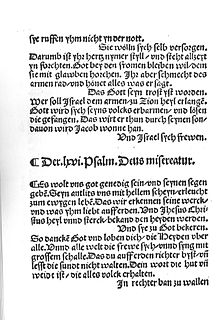
"Es woll uns Gott genädig sein" is a Lutheran hymn, with words written by Martin Luther based on the Psalm 67. The hymn in three stanzas of nine lines each was first published in Wittenberg in 1524. The hymn, with a tune by Matthias Greitter, was set to music by composers including Heinrich Schütz and Johann Sebastian Bach. It was translated to English and has appeared in 25 hymnals.

The Luther Monument is a group of statues that was erected in Worms, Rhineland-Palatinate, Germany, to commemorate the Protestant reformer Martin Luther. It was designed and partly made by Ernst Rietschel, and unveiled on 25 June 1868. The monument consists of a group of bronze statues on stone plinths centred on a statue of Luther, surrounded by statues of related individuals and allegorical statues representing related towns. The elements are arranged in the shape of a castle, recalling Luther's hymn "Ein feste Burg ist unser Gott". It is one of the largest Luther Monuments, and shaped views of the reformer. Copies of the central Luther statue are located in Europe and the United States, including the Luther Monument in Washington, D.C. (1884).
References
- ↑ Robin A. Leaver Luther's Liturgical Music: Principles and Implications - 2007 -- Page 55 "It appears that the Latin text was added by Conrad Rupsch, the former Kapellmeister of Frederick the Wise and collaborator with Luther on the Deutsche Messe."
| This article about a German composer is a stub. You can help Wikipedia by expanding it. |